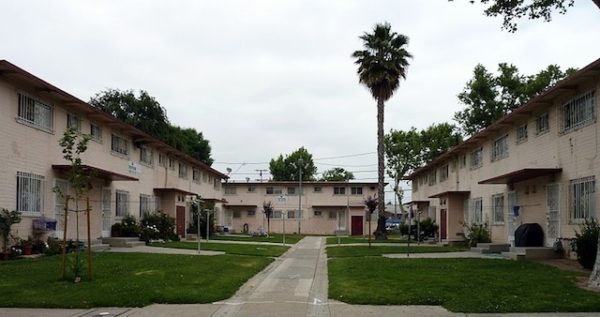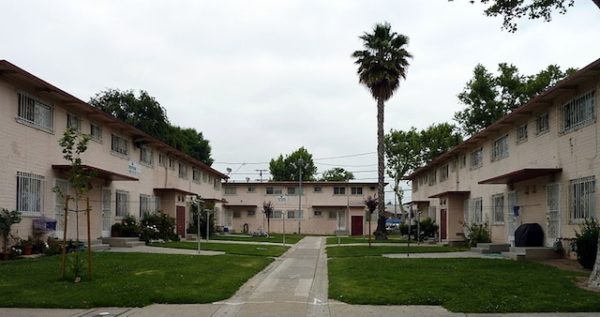Latino Gang Leader Who Planned Firebombing and Ambush Attacks of Black Homes In L.A. Housing Project Sentenced
A Latino gangbanger who orchestrated a plan to violently smoke out several Black families from their East Los Angeles homes in 2014 was sentenced to 16 years in federal custody Tuesday.
Carlos “Rider” Hernandez, 36, was the leader of Big Hazard, a ruthless street gang that for years terrorized the Boyle Heights neighborhood in East L.A. Part of the gang’s mantra was forcing all unwanted Black residents out of their territory.

Hernandez coordinated an unprovoked attack the night of Mother’s Day 2014. Eight members of the Big Hazard street gang tossed lit Molotov cocktails through the windows of three Africa-American families’ homes as they were sleeping. Each home was occupied by children at the time. The gangbangers also firebombed the home of a Hispanic woman who lived next door to one of the Black families.
The gang’s intent was “to force the African-American victims to move from the (housing tenement),” according to federal prosecutors. Senior U.S. District Judge Christina A. Snyder handed down the ruling against Hernandez during a sentencing hearing Tuesday afternoon.
“I think that the sentence is intended to … send a message to those in the community that this kind of conduct will not be tolerated, and also to Mr. Hernandez that this conduct will not be tolerated,” the judge said. “This is not a time for any court to tolerate hate crimes, and that is not my intention to do that by virtue of this sentence.”
The case, which was investigated by a federal task force, remained unsolved for two years. Hernandez was one of eight men that a grand jury indicted in 2016 on felony counts that included conspiracy to violate civil rights and attempted arson of federal property.
He was the last of the defendants to be sentenced. Snyder said on Tuesday that Hernandez received “by far and away” the stiffest punishment among the group. Jose “Lil’ Moe” Saucedo, who received 13 years in federal custody, was the co-defendant with the closest comparable sentence. The other offenders’ sentences ranged between 42 months and 12 years, according to a press release that the U.S. Attorney’s Office issued Tuesday.
“The defendants in this case perpetrated hate crimes that targeted innocent victims in their homes simply because of their skin color,” said acting U.S. Attorney Tracy L. Wilkison. “These despicable acts are simply unacceptable in our society. We are committed to protecting everyone’s civil rights, and anyone who participates in this type of conduct will find that the federal government will marshal all of its resources to ensure they are brought to justice.”
Snyder sentenced Hernandez to a year for the counts of conspiracy to violate civil rights, violent crime in aid of racketeering, and criminal interference with fair housing rights. She handed down a 10-year sentence for the use of fire in the commission of a federal felony charge, and five years for carrying a firearm in the commission of a crime of violence.
Hernandez is already serving time in state prison for a Riverside County conviction. The L.A. Times reported that stemmed from an armed robbery for which Hernandez was sentenced to 17 years. His federal sentence will run concurrently with the state imprisonment.
Hernandez must pay restitution — that amount will be determined at a hearing in the future. He’ll be on probation for three years after his release from federal custody. Snyder ordered him to participate in outpatient substance abuse treatment as well as a counseling program. She also recommended him to undergo mental health treatment while in prison and ordered him not to associate with Big Hazard gang members after he’s released.
Hernandez did not give a statement during the hearing. After the sentence, he asked Snyder to recommend that he be sent to a federal prison in the Western region of the country when he’s placed in a Bureau of Prisons custody. The judge agreed to make that recommendation.
Hernandez and the other defendants were members of Big Hazard, a murderous East L.A. street gang that dates back to the early 1940s. The organization was part of a network of Latino gangs affiliated with the Mexican Mafia crime syndicate, prosecutors say.
The Ramona Gardens Housing Project was in the heart of Big Hazard’s turf and served as the gang’s base of operations. Tenancy in Ramona Gardens was overwhelmingly Hispanic in 2016 — only 3 percent of the residents were Black at the time, according to the indictment.
Hernandez admitted to masterminding the plan to firebomb some of the Black tenants at Ramona Gardens. Prosecutors said Big Hazard preyed on Black residents living on their turf and found ways to intimidate them.
Hernandez called a gang meeting on May 11, 2014 and shared his plan, telling his fellow gang members he wanted to “get the ni—-s out of the neighborhood,” indictment said.
He gave them instructions and specified assignments for each of them. Some he told to smash out the windows while others were ordered to tossed the lit Molotov cocktails into the homes through the broken glass for maximum damage. Hernandez even supplied the team with gloves, hammers and masks to disguise themselves.
He was armed with a semi-automatic handgun and drove the culprits to the housing project in a stolen van. They pulled the firebombings off shortly after midnight May 12, 2014.
The combustible Molotov cocktails caused several fiery explosions, but no one was hurt during the attacks except Hernandez himself. Firefighters were quickly able to quell the flames.
All of the defendants admitted to federal investigators that the gang targeted the Black victims because of their race. Prosecutors said the Big Hazard took it as a point of pride to drive Black families out of the neighborhood and they wanted to send a potentially deadly message to the victims they weren’t welcome.
One of the bombs narrowly missed a mother asleep on a couch with her infant cradled in her arms. Prosecutors said the woman rolled off the couch with her baby when she heard a window shatter.
There were five children sleeping inside one of the homes at the time and three children in another. A third unit was occupied by a Black woman with her five children and grandchildren. Hernandez cut his right arm on a piece of broken glass while throwing a lit Molotov cocktail into that family’s window, according to the indictment. He bled profusely, and one of the other defendants had to drive him to a local hospital to receive treatment.
“There is absolutely no place for race-based violence in a civilized society,” said Kristi K. Johnson, a director of the FBI’s L.A. bureau. “The FBI will continue to protect the civil rights of our community by holding responsible anyone so filled with hate that they would attempt to commit such heinous violence based on the color of a victim’s skin.”

